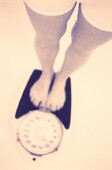
THURSDAY, Aug. 20, 2015 (HealthDay News) — Eating “on the go” may thwart people who are watching their weight, new research suggests.
The study, involving three groups each with 20 women, tested the effects of various forms of “distracted” snacking — eating while walking, watching TV or having a conversation. It found that among women who were currently dieting, eating while moving had an undesirable effect: They ate substantially more than other dieters a short time later.
It’s not clear what the findings, from an “artificial” lab study, could mean for weight-conscious people, the researchers said.
“In the real world there are many other factors — such as [food] availability, mood and peer pressure — that influence what and how much we eat,” said lead researcher Jane Ogden, a professor of health psychology at the University of Surrey, in England.
“But,” she added, “the results from this study indicate that for dieters, eating on the go may well lead to them overeating later on in the day.”
Why would that be? According to Ogden, it may be a mental effect: People who eat on the run may not be fully aware of what they’re eating, or they may feel like they “deserve” more food later on because they are being active.
And dieters may be especially prone to that mindset, Ogden said. Because they are habitually denying themselves, she explained, they may overeat when they feel they’ve earned some extra calories.
It’s unlikely that women in this study did actually need those extra calories, according to the researchers. Those who ate on the go simply walked around a corridor for five minutes, so their calorie-burning was minimal.
In contrast, their calorie intake, just a short time later, was substantially higher than that of dieters who’d snacked while watching TV or having a conversation. They were especially fond of gobbling chocolate.
Jennifer McDaniel, a registered dietitian, agreed that dieters who eat on the go might feel they’ve earned the right to indulge.
“We often overestimate how much we burn when we move, and I believe that even walking for a mere five minutes potentially justified the intake of [chocolate],” said McDaniel, a spokesperson for the Academy of Nutrition and Dietetics.
But she agreed that it’s difficult to tell whether a lab experiment would translate well into real life. And the big question is whether people who eat on the go are actually more susceptible to weight gain over time.
A long-term study is necessary to answer that question, McDaniel said. Even then, she noted, it could be tough to weed out the effects of eating on the run: People who sit down to eat “mindfully” are also more likely to choose nutritious foods and have other healthy habits, while those who eat on the run may be downing a lot of processed convenience foods.
The findings, reported Aug. 20 in the Journal of Health Psychology, are based on 60 women, about half of whom were dieting.
Ogden’s team randomly assigned them three “distracted eating” groups. In one, women ate a cereal bar while walking around for five minutes; a second group ate while watching TV; the third ate while having a conversation.
A short time later, all of the study participants were offered snacks, including chocolate, chips, carrots and grapes. Overall, dieters who’d walked while eating their cereal bar ate more calories at snack time — and about five times more chocolate — than other dieters.
Eating on the go did not make nondieters indulge in chocolate, however.
It’s unclear why the other forms of distracted snacking did not encourage overeating later on. And the findings do not mean that people should make a habit of eating in front of the TV, McDaniel said.
Other studies, she said, have found correlations between TV time, overeating and obesity — though it’s not clear that TV viewing is the root of the problem.
Despite all the unknowns, it makes sense to eat more mindfully, both Ogden and McDaniel said.
“Focusing on what we eat allows us to slow down, and actually taste the flavors and textures of the food,” McDaniel said. That, she added, may help you feel more satisfied and eat less at that meal — and possibly the next.
Ogden recommended making every meal an “occasion” to take care of yourself.
“It’s important to punctuate your day with breaks so that you can recharge and take stock as a means to relieve stress and work more effectively,” Ogden said. “It’s also important to turn eating into an occasion so that food is registered and eaten mindfully. Putting these two needs together make sense.”
More information
The National Eating Disorders Association has tips on mindful eating.
Copyright © 2026 HealthDay. All rights reserved.

